By Jana Julian | Staff Writer
Food Not Bombs is an international movement which started in 1981 with the goal of inspiring communities to participate in changing society and focusing resources towards problems such as hunger, homelessness, and poverty while seeking an end to war and the destruction of the environment.
The chapter here in Honolulu started after the establishment of the deOccupy Honolulu movement of 2011, which was an offshoot of the larger movement Occupy Wall Street. Every Sunday, between 5 p.m. and 8 p.m., volunteers from the Honolulu Food Not Bombs chapter and members of the homeless community come together to eat, jam and talk story at Thomas Square Park.
“It’s humongously different than any activity or, let’s say, a place where we can get food,” said Randy, who was formerly homeless but has recently moved into a studio and only gave his first name because he was concerned for his safety. “We do have other places like the [River of Life] Mission and IHS [The Institute for Human Services] and then when churches meet us in the park. This one is hugely different, much more social. It’s the only one actually where it’s just a like a normal social situation.”
Not only is this a weekly event that facilitates interaction between community members with delicious vegetarian food, donated goods, and good conversation, the people attending also see this as a continuation of protest against food insecurity, poverty and other issues that contribute to the homelessness here in Hawaiʻi.
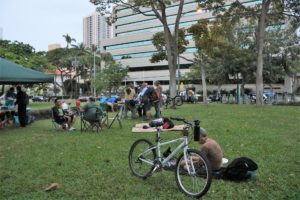
Community members participate in Food Not Bombs. (Photo by Jana Julian)
“We are fighting against the unequal distribution of food,” said Sharon Suzuki, who volunteers weekly with Food Not Bombs. “There is food, food exists, but it doesn’t get to the people who are hungry and who need the food. So the protest of Food Not Bombs … and it’s around the world, is on the economic situation where people don’t have food to eat but the food exists, and it’s not given to the people who need it.”
Community members use this gathering as an opportunity to talk about issues experienced by the homeless community here and to help assist with any needs.
“I try to get communications between jobs and hiring people, showing them how to get some kind of education,” said Samuel Mitchell, a former union representative for the shipyard. “Food Not Bombs is all over the United States and basically what we do is try to get the public involved in the [homeless] community to know what’s going on and to bring clothes and not only food but just the social aspect of talking to people.”
While these potlucks tend to have a relaxed and friendly environment, there are also moments of sadness and anger when volunteers and those experiencing homelessness talk about how they have been mistreated by the Hawaiʻi state government and law enforcement.
“I’ve been doing activism since 2012, 2013, and Food Not Bombs is one is one of the actions that have kept going since they shut down deOccupy Honolulu,” said Derek Warren, a 26-year-old Hawaiian activist and student at UH Mānoa. “So Food Not Bombs has been pushed around the park based on park boundaries. Before, areas of the park that were just common areas … you didn’t need a permit, you didn’t need anything official, you [could] put up tents. Since homeless have been encamping here, [the government has] made these arbitrary boundaries, so we continue to serve food … but the state has been pushing us around.”
Over the years, the state of Hawai′i has passed laws that have made life more difficult for the homeless community. In 2014, the city of Honolulu passed a bill making it illegal for people to sit or lie on sidewalks in Waikīkī [unless they are there for an event or it is a medical emergency], and it allowed for the confiscation of their possessions during sidewalk sweeps.
Food Not Bombs continues to host a weekly potluck on Sundays, operating on donated food from grocery stores and food brought from volunteers. Anyone is welcome to volunteer to serve food and/or donate non-perishable foods, clothing, toilitries and medical supplies.

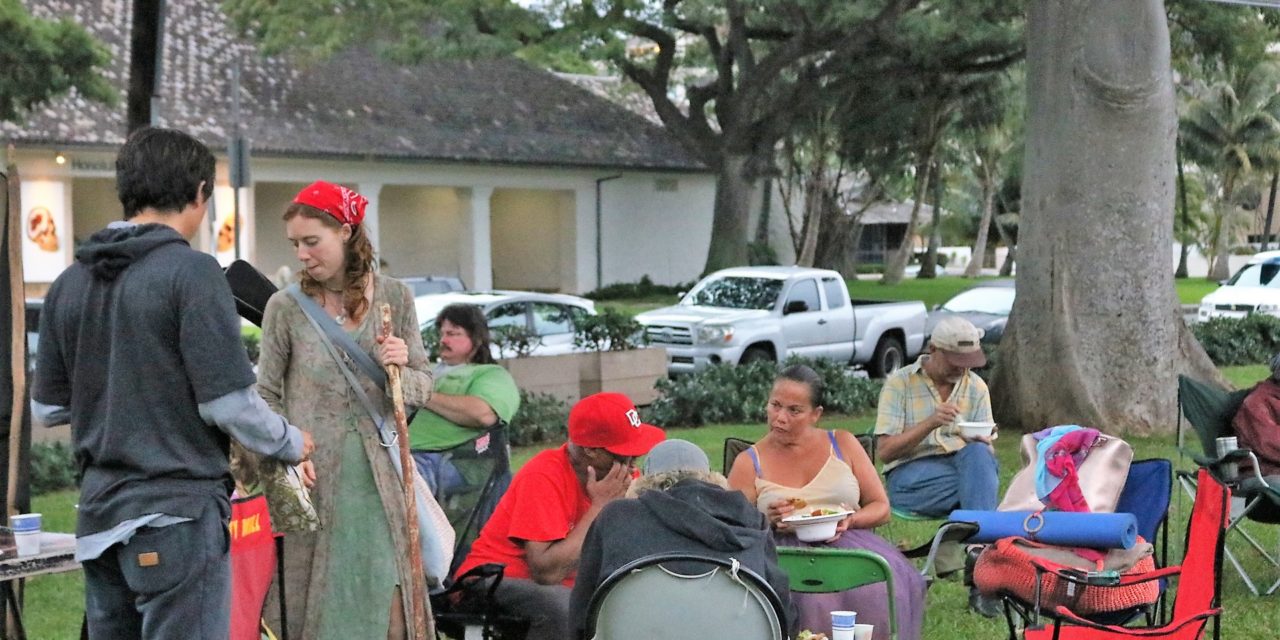


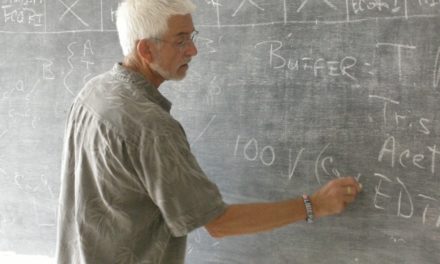
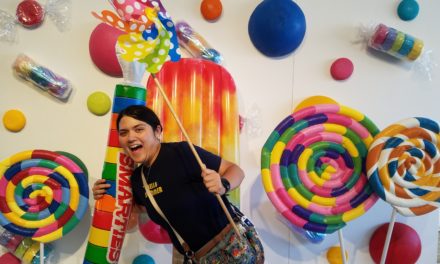
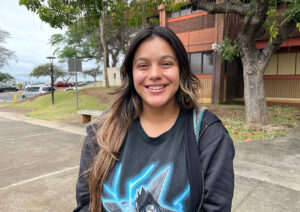
I have checked your site and i have found some duplicate content, that’s why
you don’t rank high in google’s search results,
but there is a tool that can help you to create 100% unique content, search for; SSundee advices unlimited content for your
blog